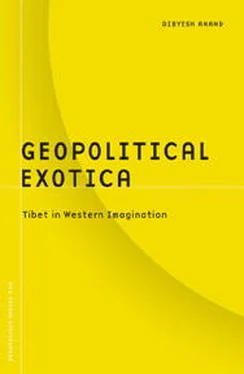The nineteenth century witnessed a closure of Tibet to the Europeans. Some travelers did manage to get in (see Woodcock 1971), but there was no official interaction between Tibet and the rising and consolidating British empire in India. By the end of nineteenth century, British India had within itself the cis-Himalayan regions of Ladakh, Bhutan, Sikkim, and Assam, some of which in turn had politico-religious relations with Tibet. Tibet saw these regions as under its influence. For British India this had a dangerous implication for the security of its northern frontiers and hence required clarity. But within the traditional Tibetan worldview, there was no imperative to define boundaries. McGranahan identifies five key features that made traditional Tibetan systems of statehood different from modern European systems: local determination and sanctioning of boundaries; sovereignty and boundary not coterminous; overlapping zones between polities; no imperative for an external ratification of rules; and privileging of power relationships between territory and center over territorial integrity (2003, 268).
Observations by Indian spies who had been active in the second half of the century pointed to continuing Chinese dominance. For instance, Sarat Chandra Das, who managed to reach Lhasa in disguise in the 1880s, argued that the "political relations between Tibet and China are now so intimate that the Imperial Residency established at Lhasa in the first quarter of the last century has converted Tibet from a protected state into a dependency of China" (1902, 178). But Tibetans refused to honor any Anglo-Chinese agreement concerning them without justifying their action by using a modern vocabulary of sovereignty or independence.
The British blamed this on the backwardness of Tibetan religion, narrow priestly interests, Chinese jealousy, and a lack of understanding of genuine friendly motives of the British (see Engelhardt 2002). The Times reported in 1885, "We hear complaints everywhere of the stagnation of trade. Here is a large market if we only insist on admission… Tibetans… are debarred from intercourse with India through sheer ignorance and the tenacity of tradition" (in Walker 1885, 27). Macaulay in his 1884 report blamed Cornwallis, who had succeeded Hastings as the governor- general of the East India Company, for not helping Tibetans in the Gorkha war in 1792 and thus contributing to their "closed" nature; he laments that had Hastings been in charge, he "would have required no pretext [for military action] beyond the fact that an unprovoked act of brigandage had been committed on a helpless child" (1972, 71; emphasis added). Paternal imperialism prevented the actors of the time to comprehend Tibetan actions in terms of fear deriving from an understanding of the violence of modern imperialism. Aris, on the basis of his study of a late-eighteenth-century Tibetan text, argues that a positive sympathy can be detected for the undefeated Marathas and their long oppositional stand against both the Mughals and the British (1994, 12)-this surely indicates some awareness among Tibetans of the nature of imperialism in India.
By the start of the twentieth century, the undefined Tibet was no longer an unmapped land to the north of the Himalayas but had come to be perceived as a buffer state, a state that could act as a buffer against the new threat on the horizon-Russian imperial expansion in Central Asia. [49]Tibet acquired new importance within the "Great Game," and the British sought to have a friendly state to buffer British India from hostile forces in the north. Chinese imperial power was in decline and seen more as a nuisance.
Filling in the Blank Space
At the start of the twentieth century, there were two phases in British India's policy toward Tibet, the watershed being Curzon's telegram of 8 January 1903. In the first phase, Curzon unsuccessfully tried a policy of direct approach, that is, of communicating with the Dalai Lama. That "the Dalai Lama had the temerity, one had almost say the cheek, to return the Indian Grand Mughal's letters unopened was sufficient cause, in Curzon's eyes, for a march to Lhasa, if only to show the Tibetan barbarians some elementary rules of human behaviour, of a code of (international) conduct!" (Mehra 1968, 360). Curzon pushed for a more active, confrontational policy.
The British Indian government informed the Home government, in a letter dated 13 February 1902,
The policy of isolation followed by the Tibetans is not compatible either with proximity to the territories of a great civilised power at whose hands the Tibetan Government enjoys the fullest opportunities both for intercourse and trade, or with due respect for the treaty stipulations into which the Chinese Government has entered on its behalf (IOR: V Cd.1920 [1904], 153; emphasis added)
The result of this new forward policy was the mission led by Francis Younghusband in 1903-4. In fact, this mission not only showed Tibetans their place in the imperial scheme of things but also em-placed Tibet in the modern geopolitical imaginary.
In his famous dispatch of 8 January 1903, Curzon mentions his two failed attempts (the third attempt was being made) to get in personal touch with the Dalai Lama; the failure of measures to "materially" improve British position on the border; persistent rumors about the Russo-Chinese deal; and his own conviction that "some sort of relations" existed between Russia and Tibet, changing the scenario:
We regard the so-called suzerainty of China over Tibet as a constitutional fiction-a political affectation which has only been maintained because of its convenience to both parties. China is always ready to break down the barriers of ignorance and obstruction, to open Tibet to the civilizing influence of trade, but her pious wishes are defeated by the short-sighted stupidity of the Lamas. In the same way, Tibet is only too anxious to meet our advances, but she is prevented from doing so by the despotic veto of the suzerain. This solemn farce has been re-enacted with the frequency that seems never to deprive it of its attractions or its power to impose. (IOR: V Cd.1920 [1904], 154-55)
Many other British Indian officials agreed with Curzon's view of Chinese control as mere "tutelage" (Sandberg 1904, 13). Charles Cock's memorandum in 1903 pointed out that "China is a hopeless factor" that had "no real hold over Tibet, and was only made use of by the Tibetans as an excuse for not communicating directly" with the British (IOR: L/P &S/18/B144 1903, 41). But there were dissenting voices too. For instance, Curzon's position went against the observations made about de jure Chinese authority in a memorandum written by William Lee-Warner in 1902, arguing that the 1890 Convention "practically recognises Chinese sovereignty over Tibet," and after the rumors of a Russian protectorate over Tibet, "We have warned China, thus again recognising Chinese sovereignty" (IOR: L/P &S/18/B138 1902, 23).
Dissenting voices were ignored, the mission was sent, and as Tibetans continued to resist British demands for opening up negotiations, the mission forced its way to Lhasa. The Dalai Lama fled but the Tibetan government was forced to sign the Lhasa Convention, a treaty that was described by Candler as "the result of an impression, upon the least impressionable People in the world" (in IOR: MSS EUR/F197/108 n.d., 3). Even though Curzon rejected Chinese control as a fiction unhelpful to a modern civilized power such as British India, the Lhasa treaty signed at the end of the invasion did not indicate a defining of Tibet in terms of independence. [50]This is understandable, for the British government was by now clearly averse to "any policy in Tibet which would tend to throw on the British Empire an additional burden" (IOR: MSS EUR/F197/106, 46). In a speech delivered on the signing of the Lhasa Convention on 7 September 1904, Younghusband mentioned "Chinese suzerainty" even though it was not included in any written text:
Читать дальше












